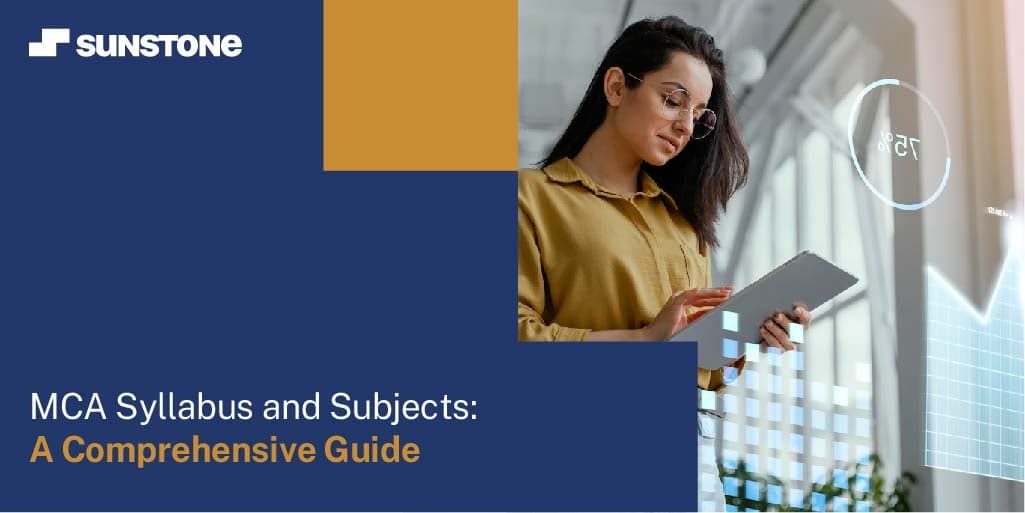5800 students unlocked their dream jobs with UG/PG programs in top colleges. Apply Now!
MCA Syllabus and Subjects: A Comprehensive Guide
Applied advanced computer courses like MCA or Master of Computer Application have been popular among students. Like any other master’s degree, the MCA eligibility criteria are that you need a bachelor's degree to join the MCA course and must have mathematics in your 10+2 or 12th. The easiest way is to enrol in a BCA course after your 12th, and upon graduating with BCA, you can enrol in an MCA degree programme.
If you want to know more about the MCA syllabus and MCA subjects, you have come to the right place. We hope this blog doubles as a comprehensive guide for aspiring students and helps them understand the MCA course syllabus.
MCA Syllabus: Semester Wise
The MCA Degree course is divided into 3 years and 6 semesters.
Students learn software development, computer programming, network, database management, and programming languages like C++, Java, etc., every semester. The syllabus also introduces students to the theories and concepts of computer science. Other than these, students get to use their learning in practical labs.
That said, the MCA syllabus can differ from one institute to another. Better you visit the college's website and download the MCA programme brochure.
To give you an idea, here is some semester-wise information.
Semester I
- Introduction in IT
- Business Systems and Applications
- Computer Organisation & Architecture
- Micro Programming & Architecture Lab
- Computer Programming with C
- Discrete Mathematical Structure
- Business English and Communication
- Business presentation and language lab
- Programming lab
Semester II
- Data Communication & Computer Networks
- Object-Oriented Programming lab (C++)
- Object-Oriented Programming With C++
- Data Structures with C
- Information Systems Analysis & Design
- Database Management System I
- Database lab
- Data structure lab
Semester III
- Unix and Shell Programming
- Statistics and Numerical Techniques
- Operating Systems and Systems Software
- Intelligent Systems
- Management Accounting
- Business Management
- Unix lab
- Accounting Systems lab
- Statistics and Numerical Analysis lab
Semester IV
- Graphics & Multimedia
- Software Engineering & TQM
- Database Management System II
- Environment and Ecology
- Operation Research & Optimisation Techniques
- Software Project Management lab
- Advanced Database lab
- Graphics & Multimedia Lab
Semester V
- A.I and Applications
- Software Engg II
- Elective 3 (Any one): Object Oriented Programming With Java, Advanced Unix programming
- Elective 4 (Any one): E-Commerce, Compiler Design
- Optimisation Techniques
- Lab: AI & Application lab, Optimisation Techniques Lab, Industrial lectures, seminar, projects
Semester VI
Seminars, project works, and internships.
MCA Course Subjects: Core Subjects and Electives
Generally, an MCA degree comprises 7 core subjects and various topics under each subject. However, some colleges or institutions may choose to add some more topics to their curriculum. So, we strongly recommend students check the brochure of MCA colleges to understand the syllabus better.
The core discipline of the MCA degree comprises information technology, business management, and mathematics. All subjects, core and elective, are within these three fields.
Core subjects
- Computer Programming with C
- Software Engineering & TQM
- Discrete Mathematical Structure
- Unix and Shell Programming
- Database Management System
- Object Oriented Programming with Java
- Operation Research & Optimisation Techniques
Elective subjects
- Programming languages and paradigms
- Visual Programming
- Compiler Design
- Advanced Unix Programming
- Distributed Database Management
- Image Processing
- Parallel Programming
- Systems Analysis and Simulation
- Managerial Economics
- Corporate Planning
- Foundations of Decision Processes
- Investment Technology
- Business Finance
- Taxation Practices
- MIS Frameworks and Implementation
- Management of Software Projects
MCA Syllabus: Recommended Books
It is better to discuss with your teachers and seniors to know what book you should follow. But to give you an idea, we are naming a few suggested books in this blog, taking notes from AICTE’s syllabus.
- Hawryszkiewycz, LT., "Introduction of Systems Analysis and Design". Prentice Hall of India, 1989.
- Rajaraman, V, "Analysis and Design of Information Systems". Prentice Hall of India, 1991.
- Senn, LA., "Analysis and Design of Information Systems". Tata McGraw Hill Book Company, 1986.
- Whiten, 1.K., Bentley, L.D., Beslow, V.M., ''Systems Analysis and Design Methods". Galgotia Publications Pvt. Ltd. 1994.
- Agarwal, R.D., "Organization and Management", Tata McGraw Hill, 1986.
- Massie, "Essentials of Management". 4th edition, Prentice Hall of India. 1996.
- Tremblay, J.P., el. al. "Discrete Mathematical Structures with Applications to Computer Science" McGraw Hill, 1987.
- Tanenbaum, A.S., "Modem Operating Systems", Prentice Hall of India Pvt. Ltd. 1995.
FAQ - MCA degree course
- What is the duration of the MCA degree course?
MCA is a 3-year long degree course divided into 6 semesters. The course may have some relaxation for distance education, and students may be allowed to stretch the course duration.
- What is the scope of MCA?
MCA is an applied degree, meaning the students will be industry ready after graduation. Therefore, the chances of getting a good job after an MCA are much higher than having other academic degrees. After completing their MCA degree, students can get a job in a reputed tech or IT company.
- How many subjects are in MCA?
MCA has seven core subjects and many elective subjects. The later semesters, the 5th and the 6th, of the course focus more on the application of knowledge through group and individual projects.
You can also check out Sunstone, one of India’s leading education services providers. We have partnered with a slew of reputed academic institutions offering popular courses, including MCA. Additionally, we offer a wide range of upskilling training and career-based interventions to enhance employability and ensure a well-rounded educational experience for all students.
HELP
Take the first step towards your dream job.
ABOUT THE AUTHOR


